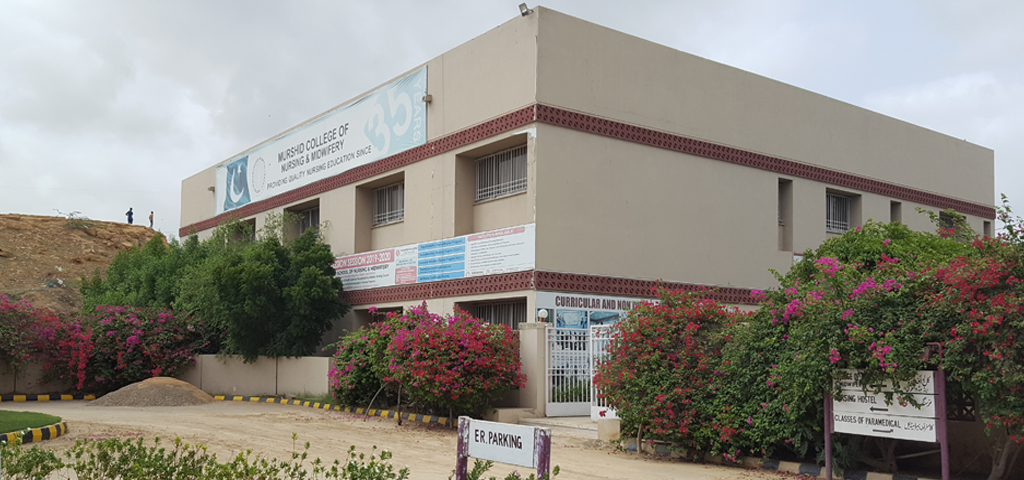Our goal is to provide healthcare facilities and awareness in line with medical standards
About the School of Nursing & Midwifery
 Murshid School of Nursing & Midwifery offers educational and training programs in healthcare services within a professional and friendly environment. Our programs combine theory and practical experience, preparing professionals ready to begin their careers in reputable hospitals.
Registered with the Pakistan Nursing Council among 239 institutes nationwide, the school prides itself on high standards of education delivered by an experienced faculty. Our graduates not only pursue rewarding careers but also contribute significantly to society by promoting human dignity, health awareness, and disease prevention.
Founded in July 1985 as a girls-only nursing school in Karachi, it was recognized by the Pakistan Nursing Council in 1986. The first batch graduated in 1988. Male nurse training began in 1991, followed by midwifery in 1992. The Pupil Midwifery program started in 2008 and evolved into a two-year Community Midwife program in 2018. Since 2017, we offer degree programs including the Four-Year Generic BSN and Two-Year Post RN BSc affiliated with Dow University of Health Sciences. Additionally, 12 technician programs affiliated with Sindh Medical Faculty have been offered since 2005.
The nursing school moved to its current premises adjacent to Murshid Hospital in 1995, featuring a 25,606 sq. ft facility with hostel and garden. Our modern infrastructure, qualified faculty, and state-of-the-art equipment create an ideal learning environment.
Students gain practical experience through placements in community and hospital settings, with opportunities for inter-professional learning and community service projects, both local and international.
Murshid School of Nursing & Midwifery offers educational and training programs in healthcare services within a professional and friendly environment. Our programs combine theory and practical experience, preparing professionals ready to begin their careers in reputable hospitals.
Registered with the Pakistan Nursing Council among 239 institutes nationwide, the school prides itself on high standards of education delivered by an experienced faculty. Our graduates not only pursue rewarding careers but also contribute significantly to society by promoting human dignity, health awareness, and disease prevention.
Founded in July 1985 as a girls-only nursing school in Karachi, it was recognized by the Pakistan Nursing Council in 1986. The first batch graduated in 1988. Male nurse training began in 1991, followed by midwifery in 1992. The Pupil Midwifery program started in 2008 and evolved into a two-year Community Midwife program in 2018. Since 2017, we offer degree programs including the Four-Year Generic BSN and Two-Year Post RN BSc affiliated with Dow University of Health Sciences. Additionally, 12 technician programs affiliated with Sindh Medical Faculty have been offered since 2005.
The nursing school moved to its current premises adjacent to Murshid Hospital in 1995, featuring a 25,606 sq. ft facility with hostel and garden. Our modern infrastructure, qualified faculty, and state-of-the-art equipment create an ideal learning environment.
Students gain practical experience through placements in community and hospital settings, with opportunities for inter-professional learning and community service projects, both local and international.
Curriculum Standard
The school follows nationally agreed competency standards for Diploma and Degree nursing programs, ensuring compliance with accreditation guidelines. Upcoming publications will define quality indicators for clinical resources and faculty practice.Government Advocacy
We actively engage in policy advocacy to support nursing education and practice, seeking sustained federal funding and favorable legislation to benefit nursing colleges and students.Accreditation
The Pakistan Nursing Council (PNC) and the Quality Enhancement Cell of Dow University of Health Sciences supervise the integrity and quality of our nursing education programs.Data Services
Annual surveys collect and analyze data on student enrollment, graduation rates, faculty, budgets, and resources, aiding benchmarking and policy decisions.Conferences and Seminars
Faculty and student development is supported through national conferences, seminars, and leadership programs, focusing on nursing education and practice excellence.Special Projects
The school pursues grant-funded projects on topics like end-of-life care, quality and safety education, and cultural competency for nurses.Communication
A quarterly Journal of Professional Nursing and newsletters will soon be published to keep nursing educators, administrators, students, and staff informed.Educational Programmes
We offer a wide range of nursing and technician training programs including:- Post RN B.Sc. Nursing (2 Years)
- Generic B.Sc. Nursing (4 Years)
- Diploma in Nursing (3 Years) — Phased out in 2018
- Diploma in Nurse-Midwifery (1 Year)
- Community Midwifery Diploma (2 Years)
- Technician Program (1 Year) – 12 Specialties
- Nurse Aid Certificate Course (1 Year)
- Assistant Certificate Program (1 Year) – 8 Specialties
